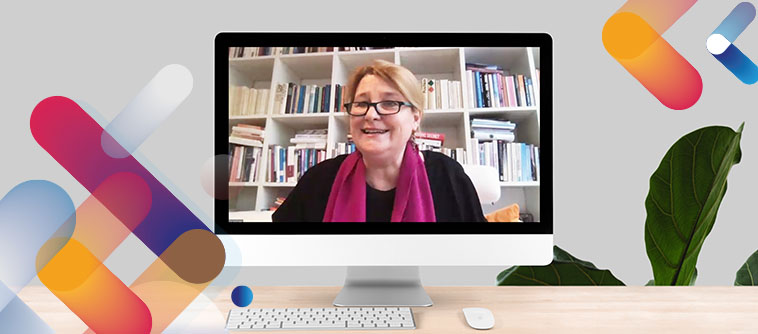You, too, can cultivate compassion, reduce stress and find happiness by using mindfulness and mental training techniques, said Professor Tania Singer in her OWP live keynote address.
What if the antidote to burnout, stress and depression during these tumultuous times is just 30 minutes of mental training each day?
This was the question tackled by Singer – Scientific Head of the Max Planck Society’s Social Neuroscience Lab – in her OWP liVe keynote address “Plasticity of the social brain: from training the mind and heart to a more caring society”.
Singer shared lessons learned from her ReSource Project, a yearlong secular mental training program of over 300 participants aimed at cultivating attention, perspective taking, compassion and pro-social behaviors through meditation-based mental exercises. Emerging scientific fields such as social and contemplative neurosciences have produced promising findings in the area of brain plasticity – and seeking knowledge in these areas is the first step.
IMD President and Nestle Chaired Professor Jean-François Manzoni touched on the possible macro-effects of this study in his introduction: “Caring economics studies to what extent biological and psychological factors can inform new economic models and decision-making skills.”
On the individual level, the results of the ReSource Project point to reduced stress and improved mental and physical health. Singer’s research showed evidence that some of the project’s mental training modules reduced 51% of the social stress response of participants.
“We need to change our internal mindset to face difficult global challenges,” said Singer. “If there is one thing we’ve learned during the pandemic, it’s that mental health is even more important than ever before.”
More and more business leaders and organizations are embracing mindfulness and empathy techniques to gain understanding of challenges, learn how to address them and determine how to lead teams through necessary transformations.
“To reach peak performance – and be physically and mentally well – we require mental training throughout our lives,” said Manzoni, noting that we are today with mental training where we were 30 years ago with physical training. “Just like the gym, it requires ongoing effort.”
Light up instead of burn out
Mindfulness and mediation are not activities that require a PhD; with these three simple exercises taken from ReSource Project models, everyone at all levels of organizations – and society at large – can take proactive steps to be happier and healthier.
1. Don’t be perfect, be present
Leaders can cultivate present-moment attention and interoceptive awareness through exercises like breathing meditation – practices that have been taught in the first training module of the ReSource Project, the Presence Model.
These secular meditations, when done on a frequent – daily or several times weekly – basis can stabilize your mind and seem to be most efficient in increasing attention and present-moment awareness.
Channel presence with a Breathing Meditation or Body Scan. For the former, focus your attention on sensations of breathing, and refocus your attention on your breath whenever your mind starts wandering. For the Body Scan, focus on various parts of your body in a systematic fashion (from the toes to the head, for example) while paying close attention to the sensations in each body part. Pressed for time? Multitask with a walking meditation using the above techniques.
2. Dare to care
Use the Affect Module to focus on cultivating care, gratitude and compassion, as well as dealing with difficult emotions through acceptance and increasing prosocial motivation.
Rather than a luxury or weakness, compassion is a powerful source to improve important social skills, altruism and global cooperation. There are new ways to train the brain and develop compassion to lead in business. On a more macro scale, increasing care motivation within societal systems can also lead to the development of new economic models.
Perform a loving-kindness meditation by imagining a baby, a cute animal, a close benevolent other, a place of safety and comfort, or focusing on feelings of warmth in the body. These feelings can then be directed towards oneself and others. Start by imagining yourself and then extend these feelings of loving-kindness and good wishes to people you like and then to people you have difficulties with, and ultimately all humans and sentient beings. Repeat phrases such as “May you be happy,” “May you be healthy,” “May you be safe,” and “May you live with ease.”
3. Foster deep learning for deep results
The ReSource Project’s Perspective Module focused on improving metacognitive awareness of thoughts and perspective taking on self and others – also referred to as mentalizing or the theory of mind.
This exercise is best begun after first completing the earlier steps in the Presence or Affect modules, as they have be proven to boost the effects of any subsequent training.
Try sitting calmly in a quiet place and seeing the perspective of people with whom you encounter difficulties in your daily life. Reflect on which beliefs may motivate this other person to act as he or she did and how these beliefs may differ from your own thoughts and convictions. Then attempt to gauge why understanding the beliefs of others differs from approving their behavior.


